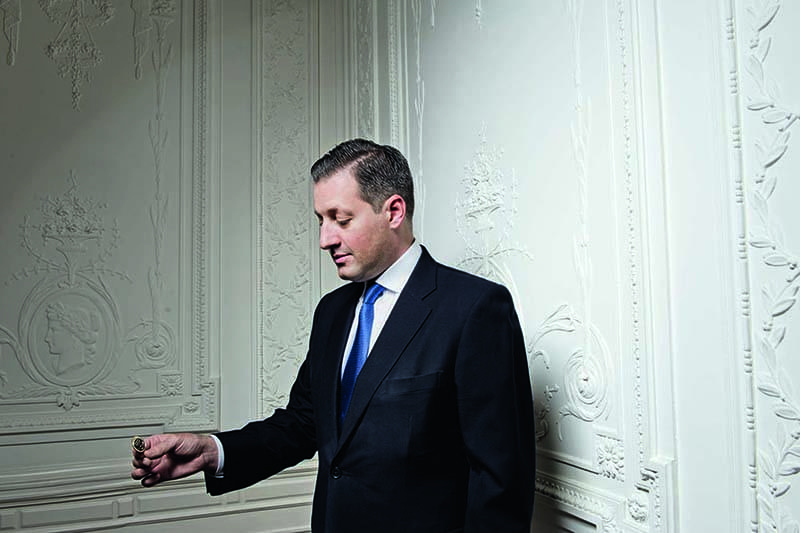Boris Collardi’s development has indeed been unprecedented. After graduating from high school in Nyon, he began his career in 1993 as a trainee at Credit Suisse, where he rose to Chief Operating Officer (COO) for European Wealth Management. In the process, he was supported by Alex Widmer, who is considered Collardi’s mentor. Widmer was also the one who brought him to Julius Baer in 2006. There, too, the Romandy native initially functioned as COO. At only 33, he landed on the trade magazine Wealth Bulletin’s (now Financial News’s) list of “40 Rising Stars in European Wealth Management.” Hardly a year later, he took over the position of CEO at Julius Baer. Since then, Collardi has committed himself to a clear strategy of acquisitions and growth—and the company values of “care, passion and excellence,” with the phrase “excellence in all we do” as his chief demand.
Whiz Kid with a Grip on Reality
On the one hand, the CEO is considered a high-flyer. On the other, he’s seen as a “down-to-earth” leader who doesn’t forget “that I don’t reach my own and the bank’s goals alone but with the backing of a great team—the employees at all 40 locations.” With four languages at his command, he can address almost all these employees in their mother tongue, enabling him to dispense with any sense of distance from the beginning. Add to that his youthfulness, which no doubt also ensures a minimum of anxiety about contact with the CEO. Collardi himself values direct and uncomplicated contact with the employees: “When someone has an internal concern, the level of inhibition about setting up a meeting with me is very low. People know that I’m there for them.”
At least, when he is there—because customer contact is also important to him. Now 38 years old, Collardi travels a lot and enjoys visiting the different markets. In the last three years, he has personally met with hundreds of clients, and he attaches great value to staying close to their needs. It doesn’t suit him to manage exclusively from his desk. He’d rather be in the middle of the action. Collardi can’t share the view that the direction of the Zurich-based banking house could suffer from all the traveling: “I don’t think that the strategic leadership of a company is related to how much time the manager spends at its headquarters. Besides, I can absolutely rely on my colleagues on the Executive Board, which means that even if I spend longer periods in our second domestic market, Asia, things keep running.”
And things are apparently running well. In the first half of 2012, assets under management rose to 179 million francs—a new high. In spite of that, these figures pale in relation to the latest deal in the history of the Zurich private bank: the acquisition of the international wealth management division of the US bank Merrill Lynch. It was through this acquisition that managed client assets were able to increase in one stroke by 40% to over 250 billion francs within the next two years. Roughly two-thirds of that came from growth markets. Ultimately, approximately half of Julius Baer’s managed assets would come from growth markets. For Collardi, the deal is another high point in his career, but not one that comes as a gift: aside from the 1.5 billion francs that Julius Baer may have spent on the acquisition of the company, which is still in deficit, the bank chief’s current aim is to use his international experience to bring unity to the two houses’ different cultures. Given his work motto, which is “deliver,” we can assume that this challenge gives him pleasure. For this man at the top loves nothing more than to deliver: facts, figures, success stories.
Asia as Second Home
In addition to the challenges associated with the most recent deal, Julius Baer’s attention is especially focused on the Asian market. A large portion of the assets under management by Merrill Lynch also come from Asian clients.
„You have to have a feel for making the right decisions at the right moment.“
The corporation also recently announced its cooperation with the Bank of China. This is already the second strategic alliance in the region, following the partnership with the Australian financial institution Macquarie. Initially, it will only involve the mutual assignment of clients: Julius Baer will receive access to Chinese private banking clients, while in China, active Julius Baer clients will be able to access the services of the Bank of China. That will be further followed with a second step involving an exchange in the product and research division. Consequently, there’s still more to do for the ambitious bank chief, who lays great stress on making sure that his words and deeds hold water. He doesn’t let the long workdays ahead scare him. In fact, next to his mentors, he cites “hard work” as the most important success factor in his meteoric rise. It’s important “to believe in yourself, to stay with it, with endurance and lots of positive energy, and always to remember that you can learn a lot from others.” On top of that, you have to have a feel for making the right decisions at the right moment. Whether the most expensive acquisition of his career to date was the right decision, only the coming months and years will show. That Boris Collardi has a feel for opportunities as well as how to use them is something that he has shown since his entry into the private banking business seventeen years ago.
